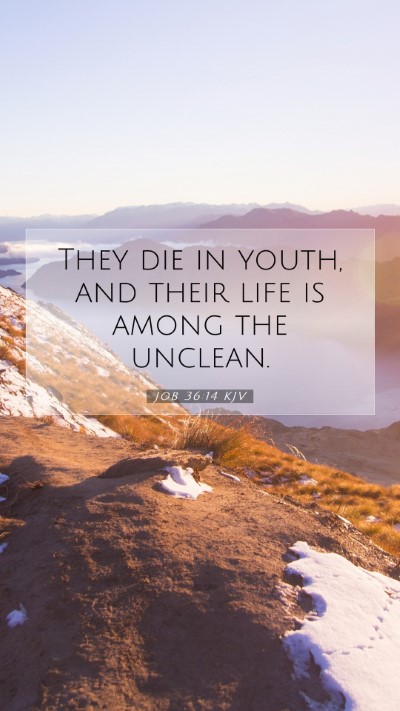Understanding Job 36:14 - A Comprehensive Commentary
Job 36:14 states: "They die in youth, and their life is among the unclean." This verse offers profound insights into the nature of divine judgment and the consequences of sin.
Overview of the Verse
This verse reflects on the fate of the wicked, emphasizing how their actions lead to an untimely end, often surrounded by spiritual uncleanness. Job's friend Elihu, who speaks here, aims to illustrate God's justice even in times of suffering.
Bible Verse Meanings and Interpretations
To grasp the full meaning of Job 36:14, we delve into the interpretations from noted commentators:
-
Matthew Henry's Commentary:
Henry highlights the theme of divine judgment, noting how young individuals may perish due to their wickedness and rebellion against God. He stresses that the cause of their demise is tied not just to physical death but to spiritual corruption.
-
Albert Barnes' Commentary:
Barnes elucidates that this verse serves to explain the judgment of God, which operates even in the lives of those who seem to escape punishment for a time. It points to the idea that early death can be a consequence of leading a life devoid of piety and righteousness.
-
Adam Clarke's Commentary:
Clarke provides a perspective on the "unclean," suggesting a deeper moral and spiritual contamination that accompanies those who live in transgression. He indicates a link between the lifestyle of the individual and their ultimate fate, reinforcing the idea of accountability before God.
In-Depth Analysis
Job 36:14 commands attention not only for its content but also for the broader context within the Book of Job. Understanding this verse within the larger narrative provides insights into the themes of suffering, justice, and redemption:
-
The Context of Job:
The Book of Job explores the nature of suffering and the mystery of divine justice. Job himself suffers immensely despite being righteous, which raises questions about how God administers justice.
-
Divine Justice:
Elihu’s argument is that God’s justice is ultimately unfathomable to humans, and suffering can sometimes be a means of divine discipline or a demonstration of God’s greatness.
-
The Role of Youth and Sin:
The reference to “youth” signifies the potential for life that is forsaken due to sinful choices. The verse serves as a stark reminder for individuals, especially the young, to consider the direction of their lives.
Application to Daily Life
When interpreting Job 36:14, it is vital to consider its implications for personal conduct:
-
Self-Reflection:
Believers are encouraged to meditate on their lives and choices, ensuring they are aligned with God’s will to avoid the pitfalls of moral decay.
-
Discernment in Actions:
This verse serves as a warning about the consequences of a lifestyle disconnected from God and righteousness.
-
Encouragement for the Youth:
Young individuals should be exhorted to seek wisdom and understanding in their formative years, considering their long-term spiritual legacy.
Relevance of Cross References
Job 36:14 is significantly related to several cross-references:
- Psalms 73:17-19: This passage reflects on the ultimate fate of the wicked.
- Proverbs 1:32-33: The consequences of rejecting wisdom and its safeguard.
- Isaiah 57:1-2: This highlights the paradox of the righteous and wicked living and dying.
Conclusion
Job 36:14 encapsulates a solemn lesson about the reality of life choices and divine judgment. Through Elijah’s monologue, the scripture emphasizes that spiritual cleanliness and righteousness are paramount to a life of purpose and true fulfillment.
Thus, when engaging with this verse, individuals can attain valuable Bible study insights, enriching their Bible verse understanding and enhancing their relationship with God.
Recommended Bible Study Tools
- Commentaries: Use various online and printed commentaries to gain diverse insights.
- Bible Study Groups: Collaborate with others for group discussions to enhance understanding.
- Bible Study Materials: Seek structured guides or online courses for deeper learning.


